‘Enemies’ To Weaken ‘Modesty’ Of Iranian Women: Khamenei
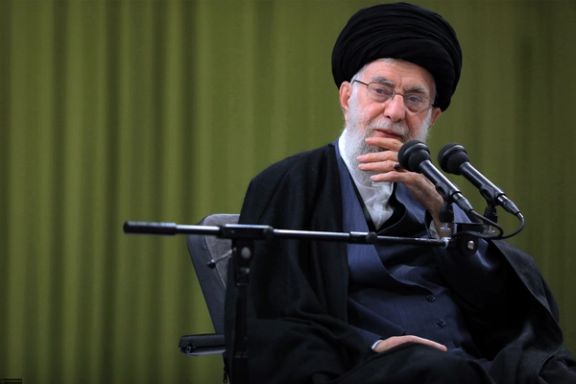
Iran’s Supreme Leader Ali Khamenei has once again attributed the anti-hijab protests to “enemies” abroad.

Iran’s Supreme Leader Ali Khamenei has once again attributed the anti-hijab protests to “enemies” abroad.
In his latest rant, he claimed this mysterious entity intends to target the intellectual strengths of the Islamic Republic by “weakening women's modesty”.
In a gathering of poets affiliated with the regime on Wednesday, without referring to the Women, Life, Freedom movement, Khamenei attributed the civil disobedience of women to “Westerners”.
He said they “have no [genuine] pity for Iranian women nor do they have any respect for their rights. Rather, they have a grudge against Iranian women and falsely present themselves as supporters of freedom and women's rights.”
He went on to say that “the West is not worthy of being the one to talk about human rights at all” claiming that "Right now, women in Western countries have the most complicated problems; [even] more than other countries."
During the recent unrest, women have been on the streets burning headscarves, cutting hair, dancing in public centers, and appearing without the clothing approved by the regime in defiance of the regime.
In the past months, the Supreme Leader and officials of the Islamic Republic have repeatedly tried to link the nationwide protests to foreign countries.
Despite the claim of the authorities about respecting women's rights in Iran, the government policies are based on reducing women's social responsibility to "wifery and housekeeping" and any protests in this regard are harshly suppressed.
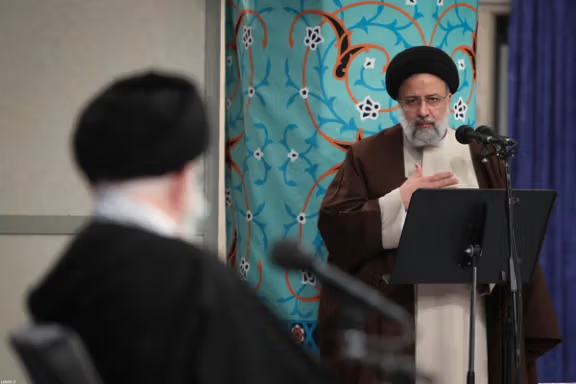
Supreme Leader Ali Khamenei’s assertion Tuesday that flouting hijab is “religiously and politically haram” has prompted officials to signal stricter measures.
At a meeting with state officials Tuesday, Khamenei claimed that foreign intelligence services were encouraging Iranian women to disobey mandatory hijab. He also claimed that “the enemy” is working according to “a plan and plot” and urged authorities to have their own plan for dealing with the issue of hijablessness.
“Discarding hijab is haram based on Sharia and also politically,” he declared. His declaration was a clear signal to authorities that they need to do anything it takes to re-establish control over women which had somehow waned following anti-regime protests.
“The order given by his excellency is clear,” Parliament Speaker Mohammad-Bagher Ghalibaf said Wednesday while promising to give precedence to any hijab-related motion or bill.
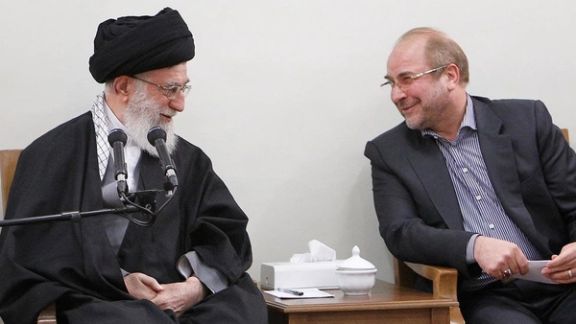
Following Khamenei’s cue, the ministry of interior in its second statement on hijab within a week, alleged that the opposition to compulsory hijab was an enemy plot advanced by foreign intelligence services and the opposition outside Iran, who through social media are trying to use it to “create deep social divides and a divide between the people and the government.”
Airport staff refusing to offer services to ‘hijabless’ women in Shiraz
Claiming that the ministry is responsible for ascertaining and defending “rights of the majority of the people,” the statement said it will fully support the activities of vigilantes who have been harassing women to follow the Islamic dress code.
The ministry also said the judiciary and other organizations involved in the enforcement of compulsory hijab will take action “against the few who act against the society’s norms” to defend the “dignity and identity of the Muslim Iranian women.”
Mahsa Amini’s death in ‘hijab police’ custody in September sparked the protests That engulfed the country nearly non-stop for four months. Many women burned their headscarves during the protests, vowing never to surrender to compulsory hijab again.
‘Hijabless’ women are now seen everywhere, even in some of the most conservative cities. For many, this is a form of civil disobedience. Some social media users have said that in some public venues such as restaurants, ‘hijabless’ women outnumber those who wear headscarves.
On Wednesday, an official of Tehran’s Metro Organization, Masoud Dorosti, said his organization has set up a “chastity and hijab taskforce” for enforcement on public transport. According to Dorosti, the first phase of the plan, giving verbal warnings to women who do not abide by the hijab requirement, has begun at metro stations. Tehran municipality has adopted similar plans.
The police and the judiciary have also resorted to pressuring businesses to enforce the hijab on their premises.
Authorities have shut down hundreds of shops, restaurants, cafes, and ecotourism facilities during the two-week New Year (Nowrouz) holidays across the country.
Earlier this week, the ministry of higher education said institutions under its coverage will no longer offer educational and other services to students who do not abide by hijab rules.
The Islamic Azad University, which is not administered by the ministry, has also announced strict measures against defiance of the compulsory hijab. The university which has over 1.1 million students across Iran has ordered its faculty to “seriously manage” abidance of the hijab rules by their students and threatened them with repercussions if students flout hijab in their classes.
“Conflict between professors and students? We are teachers not police or sheriffs. It is knowledge that will eventually be harmed by destroying teachers’ relationship [with students],” a professor of criminal law at Tehran university, who was recently sacked for criticizing the regime after the execution of four young protesters, said in a tweet Tuesday.
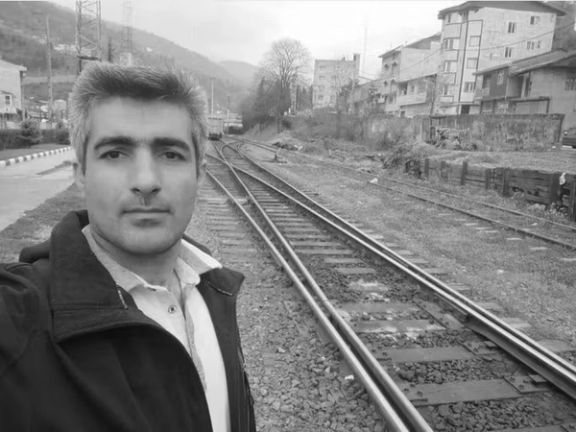
Security organs in Iran have arrested three family members of a victim of the nationwide protests that have rocked the country in September 2022.
Agents on Wednesday arrested the parents and a brother of Javad Heydari who was killed last September by the security forces of the Islamic Republic in a village near Qazvin west of Tehran.
Fatemeh Heydari, Javad’s sister, announced in a tweet that her parents and Mohammad, one of his brothers, were arrested on Wednesday.
The arrests come as Ruhollah Heydari, another member of the family, has been detained since Monday.
Javad Heydari's sister was also fired from her workplace, Iran’s Mapping Organization in March.
During the protests, ignited by the death in custody of 22-year-old Mahsa Amini, hundreds of people lost their lives and many more received permanent injuries.
The authorities not only failed to accept any responsibility, but put pressure on some of the victims' families who made statements against regime officials during funerals or on social networks.
According to Amnesty International, the Iranian authorities’ arbitrary arrests, intimidation and harassment of relatives of victims exposes their inconceivable cruelty and sinister attempt to cover up their crimes.
“The authorities have not only condemned families …to a lifetime of inconsolable sadness, but they have also inflicted extreme mental anguish upon them through cruel restrictions on burials, commemorations and relentless intimidation aimed at enforcing silence,” said Heba Morayef, Amnesty International’s Regional Director for the Middle East and North Africa.
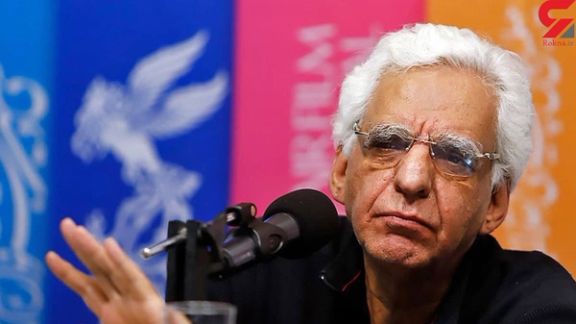
A popular and highly respected Iranian film director, Kyumars Pour-Ahmad, 74, has tragically taken his own life.
The news comes amid reports of the cultural icon’s sense of hopelessness in the face of the country’s dire political and economic situation having led to his death.
Pour-Ahmad had described the popular protests that started last September as “bloody and painful” and wrote: “With all the scorching we have on our souls, what festival, what festivity?”
Initially, reports had claimed Pour-Ahmad died of a heart failure, but the Iranian magazine, Today’s Film, reported that he ended his life because of “depression, despair, the feeling of uselessness and lack of hope in future. Simply so terrible, unbelievable, horrible and shocking,” citing sources close to the star.
The verdict of the 74-year-old’s suicide was ruled by Mehdi Fallahmiri, the prosecutor in northern Gilan Province, who initially dispatched a murder investigation team on hearing the news of Pour-Ahmad's death.
Though the suicided was confirmed, Fallahmiri said “further investigation” is needed. The body has been transferred to the coroner’s office.
Unconfirmed reports say that he left an eight-page letter explaining his decision. However, the content of the note has not been disclosed.
Mehdi Kouhian, an attorney who has been close to the legal cases of detained artists during recent protests recently warned of the toll the unrest and subsequent crackdowns on the cultural community were having in a chilling foreboding of the fate of Pour-Ahmad.
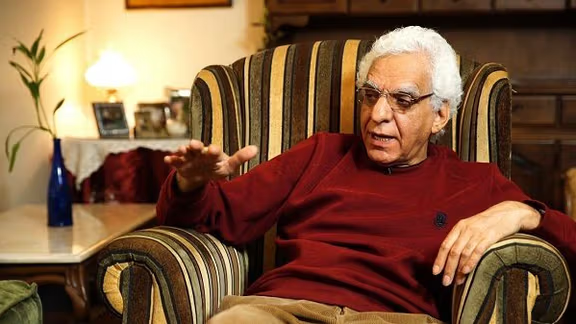
Just days ago, he publicly recommended that the community of artists should help those who were being persecuted by the government by providing secure therapy services.
In a tweet Thursday, he said: “As a result of close contacts I had with dissident artists in the past seven months, I warned less than a month ago about their psychological condition.”
The veteran filmmaker was not a revolutionary and once admitted that before the 1979 revolution he had a beard, but when he saw protesters burning a bookstore, he shaved it off.
Although he was not an outspoken critic of the regime, like some other famous artists who have been jailed, he had become critical of the clerical regime’s intrusion into artistic works.
He had spoken out against censorship and Iran’s annual Fajr Film Festival, where the government increasingly intervenes to ban films it deems “unsuitable”.
Some have already labeled Pour-Ahmad’s death as “government murder” with tributes pouring in from around the world.
Journalist Noushabeh Amiri, who is now in Europe, Tweeted: “Pour-Ahmad was killed by the filthy Islamic Republic, yes, killed.”
She went on to say, “Killing can take different forms. When you chock off the air from an artist, when you pressure him every day, when you take his unfinished film and give it to security agents to complete it, when…This is how they killed Kyumars.”
He will go down in history as one of Iran’s greats. His most famous production was a TV serial called Majid’s Stories, about a boy living with his grandmother, which captivated children, teenagers and adults alike.
Film critic Mehrsa Rahnema told Iran International TV that Pour-Ahmad was one of the few Iranian filmmakers whose films and serials captured the hearts of people of all ages, because he was so close to the real lives of ordinary people.
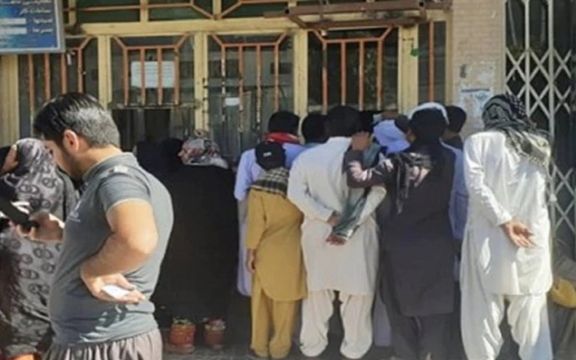
An Iranian lawmaker representing the mainly Sunni Muslim southeastern Sistan-Baluchestan Province says the poverty in the region has reached extreme levels.
Member of Parliament, Mohammad Sargazi, said most citizens consume water, tomato paste and bread as their main meal.
Sistan and Baluchestan is the poorest province of Iran with a population of around 4 million, including 700,000 Afghan nationals.
During the past years, this region has experienced many crises, including shortage of fuel, bread, and drinking water, as well as drought, widespread unemployment and increasing poverty.
Despite frequent promises to improve the situation, successive administrations have done little to invest in the region, create jobs, build housing or even decent schools. Some children study outdoors, while teenagers smuggle small quantities of fuel to neighboring Pakistan to make some money.
Narcotics smuggling from Afghanistan is also a serious problem in the region, with hundreds of small-time traffickers executed each year according to Iran's tough criminal laws.
In the recent popular protests following the death in custody of Mahsa Amini, Sistan-Baluchestan has had the highest number of victims among 31 provinces.
The Islamic Republic has been struggling with high inflation since 2019, but the raging inflation in the past Iranian year which ends on March 20, was seriously different from previous years.
Food prices continue to climb as the national currency declined by 50 percent in the past six months. According to the report of the Statistical Center of Iran (SCI), in some months, the food and beverages inflation hit 87%.
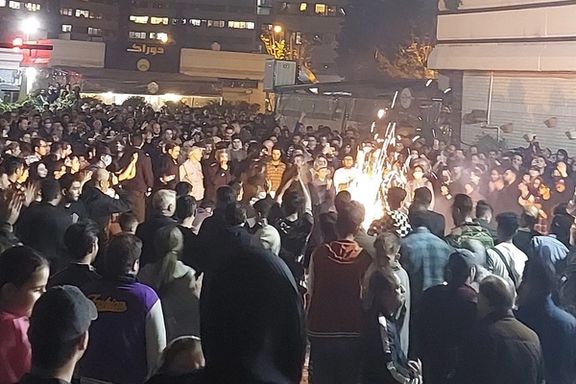
As Iran’s financial crisis continues, former President Hassan Rouhani has claimed that his pragmatic government would have handled the situation more efficiently.
Rouhani alluded to a temporary rise in the value of Iran’s rial in late March when news emerged that his former nuclear negotiator and deputy foreign minister Abbas Araqchi (Araghchi) had gone to a diplomatic tour of Syria and Lebanon.
"If former Foreign Minister Zarif went for that mission rather than his deputy, the rate of exchange would have possibly dropped [more] by 50,000 rials," he told former aides in a Nowruz gathering this week.
Rouhani and Iran’s reformists have been blaming conservatives and hardliners who control both the presidency and the parliament of squandering the chance to reach an agreement with the West over Iran’s nuclear program, or the inability to manage the economy amid US sanctions.
Hardliners offer contradictory responses. They blame the sanctions when pressed to explain their economic failures, but also claim economic progress is not dependent on sanctions when they want to justify their anti-West ideology or defend their pro-China and pro-Russia policies.
Rouhani dismissed his successor's claim about lack of any connection between foreign policy and economy as "baseless." He said, "at least twice Iranian governments managed to reduce the inflation rate; once between 2003 and 2005 under [moderate] President Mohammad Khatami, and again in the years 2016 to 2018 in my own government."
He reminded that following the 2015 nuclear deal with the West, Iran's economic growth was strong.

Meanwhile, he once again called for a referendum in Iran to determine foreign and domestic policies.
In a related development, conservative pundit Mohammad Mohajeri wrote in a commentary in Etemad newspaper that Iranians will no longer take part in elections just out of a sense of religious or national responsibility.
He added that the undecided [grey] part of the Iranian population now calculates whether to take part in the elections based on how it might affect its livelihood.
However, the emergence of political alliances in the conservative camp and the discussions about impeaching some of the cabinet ministers show that the issue of elections is not totally out of the people's agenda. By discussing impeachments, the government's political rivals signal their presence.
He recalled that the previous parliamentary election was affected by Trump's withdrawal from the nuclear deal with Iran, the Covid pandemic and the people's disillusionment about the possibility of any change in the structure of the government. The result, he said, was unprecedented low turnout which was lower than 20 percent in some of Iran's big cities.
"Now the people are waiting for a move [in the top layer of the political structure] that would indicate there is a will for change," Mohajeri said, reminding that the weakness of the current parliament, possibly the weakest one in the history of Iranian parliaments, leaves no hope in the legislative body. Meanwhile, the regime’s increasing willingness to bar the candidacy of even loyal politicians leaves very little hope for participation in the elections.
Mohajeri expressed regret that although following the shock of the 2022 protests disconcerted officials talked about reforms, but a few weeks after relative calm, they seem to have forgotten their promises. Politicians and regime insiders might be happy even with small changes, but those who took to the streets for over five months and the women who are staging a spectacular show of civil disobedience by rejecting compulsory hijab may have big ideas in mind.